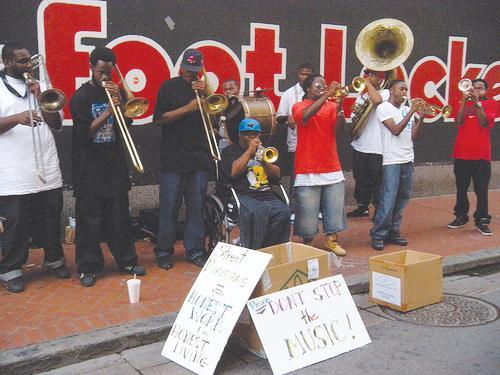An ordinance giving a curfew for all street musicians in New Orleans has been put on hold while officials redraft a better compromise between residents and musicians.
Enforcement of the curfew — which prevented jazz musicians from playing on the street between 8 p.m. and 6 a.m. — generated protests from people who feared the ordinance would harm the local culture.
Lisa Palumbo, marketing professor at the University of New Orleans and manager of To Be Continued Brass Band, the main band protesting the curfew, said the ordinance had been suspended, and the band hasn’t had issues with enforcement of the curfew.
“There have been meetings to address a new draft of the ordinance,” Palumbo said. “I wasn’t allowed to go, so I don’t know exactly what happened at the meeting.”
City council members for the district have set up an informal task force to discuss the ordinance and look into larger questions about city-wide sound, said Mary Howell, the lead attorney defending the street musicians.
“Everyone would like to find a good solution for these issues that does not involve litigation, and I’m hopeful that common sense and sound thinking will prevail,” Howell said.
Howell said the laws in place regarding street music are unconstitutional either in the way they are on the books or the way they are used.
“These are overbroad laws that cover music, which is a form of speech, which is protected by the First Amendment,” Howell said. “The process of change involves trying to make sure we have laws that are both constitutional and appropriately applied.”
New Orleans police are currently not enforcing the curfew.
“They’re getting close to a change,” said Officer Roger Jones, a quality of life officer for the New Orleans Police Department. “When they do, we will start a re-education program before we actually enforce the new ordinance. There will be a media press release that involves any initial information, public announcements and an advisory law to let everyone know what’s going on before we write people up.”
The curfew started being enforced in mid-June when police officers distributed the ordinance to bands not honoring the 8 p.m. curfew.
The enforcement was met with an array of protest from community members and those associated with the New Orleans music scene, as well as a Facebook group Palumbo started in response to the occurrences. The group, “Please Don’t Stop the Music. Let New Orleans Street Musicians Play,” has garnered more than 20,000 fans since its inception.
Jones said that in a survey of the city, some residents affected by noise agreed 8 p.m. was early and they would lean for an extension of the hours musicians can play on the street.
“You can’t please everyone, but it’s better to at least have the greater majority be the most satisfied part of the community,” Jones said. “There is a fine line when you’re trying to enforce the law. It’s not always black and white — there’s a gray area. Human beings make a point to negotiate, mediate and come together and offer opinions.”
____
Contact Morgan Searles at msearles@lsureveille.com
New Orleans street musician curfew undetermined
September 23, 2010

Members of To Be Continued Brass Band play music on a New Orleans street behind a sign reading “Please Don’t Stop the Music!”




